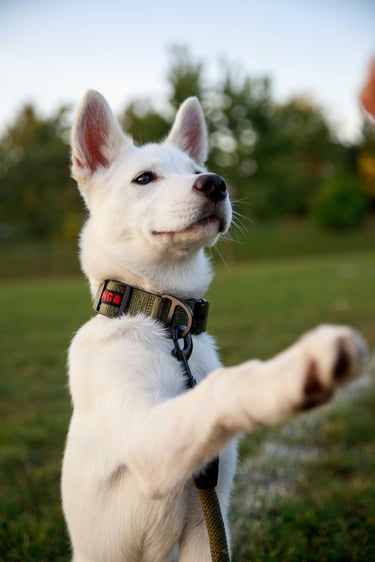Understanding Your Puppy: How Dogs Learn and Grow. Part 3
Uncover the secrets to how dogs learn and the power of positive reinforcement and early socialization for a well-adjusted companion. Part 3 of this 5 part series.
8/22/20252 min read


Understanding how your dog learns is fundamental to successful training and building a strong, trusting relationship. It's not just about teaching commands; it's about shaping a well-adjusted companion. Your dog's behavior and personality are a unique blend of their genes and their experiences. As owners, it's our responsibility to provide the experiences that allow them to reach their full potential and become well adjusted dogs.
The Power of Positive Reinforcement
Dogs, much like humans, learn significantly through association. They observe, imitate, and learn through trial and error, quickly figuring out which behaviors lead to positive outcomes and which lead to negative ones. This is where positive reinforcement becomes your most powerful tool in dog training.
What is positive reinforcement? Simply put, you give your dog something they want when they perform a behavior you like. This could be a tasty treat, their favorite toy, enthusiastic praise, or even a scratch behind the ears – anything your individual dog finds rewarding.
The beauty of positive reinforcement is that it creates a willing participant. Your dog learns to associate desired behaviors with pleasant rewards, making training a positive and engaging experience for them. In contrast, training under the threat of punishment (whether it's raising your voice, loud noises, or physical reprimands) can lead to fear, reluctance to participate, distrust, and even defensive aggression. We want a happy, confident dog who enjoys learning with us!
The Importance of Socialization and Fear Periods
A puppy's socialization begins at birth and continues until they reach physical maturity around 18 months. However, the most critical period for shaping their personality and behavior is between 3 and 12 weeks of age. During this sensitive time, regular, gentle handling and consistent social interaction with other dogs and humans are vital for building your puppy's confidence.
Continued and controlled exposure to a diverse range of individuals, places, sounds, textures, and smells ensures your dog learns to feel safe and secure in different environments. Think about the situations you want your adult dog to handle with ease and joy – meeting new people, visiting busy places, or interacting politely with other dogs. Creating as many positive experiences as possible early on is key to fostering a well-adjusted dog.
You should also be aware of fear periods. These are short windows when puppies react more strongly to new stimuli. The first usually occurs between 8-11 weeks, and the second during puberty (6-14 months). Negative experiences during these periods can have a lasting impact on your puppy's development and stress resilience. Understanding these phases helps you navigate them with extra care and positive reassurance.
By understanding how your dog learns and the critical role of positive experiences, you're setting the stage for a lifetime of joyful companionship.
Need help with your puppy or a boisterous or fearful adolescent dog. Give me a call or book a session with me right away!
078 234 83 53 (Whatsapp)
